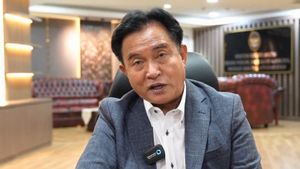JAKARTA - Along with technological advances and the opening of access to information, English mastery is one of the determinants of individual competitiveness. Although many educational institutions and courses are trying to improve language skills, challenges are still faced in ensuring the quality and equity of education in all regions. Uneven access and varying teaching quality are the main barriers.
English mastery can have a direct impact on the global competitiveness of a country. In an international work environment, the ability to communicate in English is an absolute requirement. If this capability is not prioritized, productivity and economic opportunities could be significantly affected.
In addition to educational factors, public awareness of the importance of English learning is also a key element. The discrepancy in English language teaching with the times has made many individuals less prepared to face the demands of the modern world of work. Efforts to improve this language ability should not only be focused on the younger generation, but also on adult age groups who want to maintain their competence.
As a result, the level of English language skills in Indonesia shows a downward trend. Based on the latest report by the 2024 EF English Proficency Index (EF EPI), Indonesia experienced a decline in ranking on a global scale. The report shows that 60 percent of participating countries experienced a decline in scores compared to the previous year, including Indonesia, which fell one place to 80th place from 116 countries.
Although this situation is worrying, there are positive signs in some groups. Data shows that the 26-30 year age group in Indonesia has the highest proficiency score, suggesting that investment in education in recent decades has yielded results. However, to create sustainable, a comprehensive and sustainable approach is needed.
"We hope that this report will continue to act as a reference as well as a reminder of the importance of strengthening human connections through an understanding of English as a global language," said EF EF EFF Operations Director of English For Adults, Fanno Hendriawan, in his statement, Tuesday, December 3.
"We also hope that, through this data, we can continue to support the journey of our friends and the people of Indonesia in increasing English skills to strengthen Indonesia's competitiveness in the global era," he added.
In an effort to improve this skill, the EF Education First, a Swedish global education company that has been established since 1965, offers the EF EF EF EFECTA English for Adults program that provides online and offline learning flexibility.
SEE ALSO:
"With the unlimited flexibility offered, private and group class options available 24 hours, adult and professional students can achieve the communication efficacy needed to be successful in today's global era," said Stefany Yacop, Marketing Director of EF EF EF EFECTA English for Adults.
In addition, EF Indonesia provides Abroad's EF Homestay program for those who want to learn English immersively abroad. This program allows students to experience cultural experience in destination countries, improve language mastery through daily interactions. By 2024, the EF has dispatched more than 10,000 students to study in various countries.
The challenge of increasing English language skills must be faced with strategies that involve all parties, from the government to the private sector. With a shared focus and commitment, Indonesia can again increase its ranking on a global scale and ensure future generations are ready to compete in an increasingly complex digital era.
The English, Chinese, Japanese, Arabic, and French versions are automatically generated by the AI. So there may still be inaccuracies in translating, please always see Indonesian as our main language. (system supported by DigitalSiber.id)
















